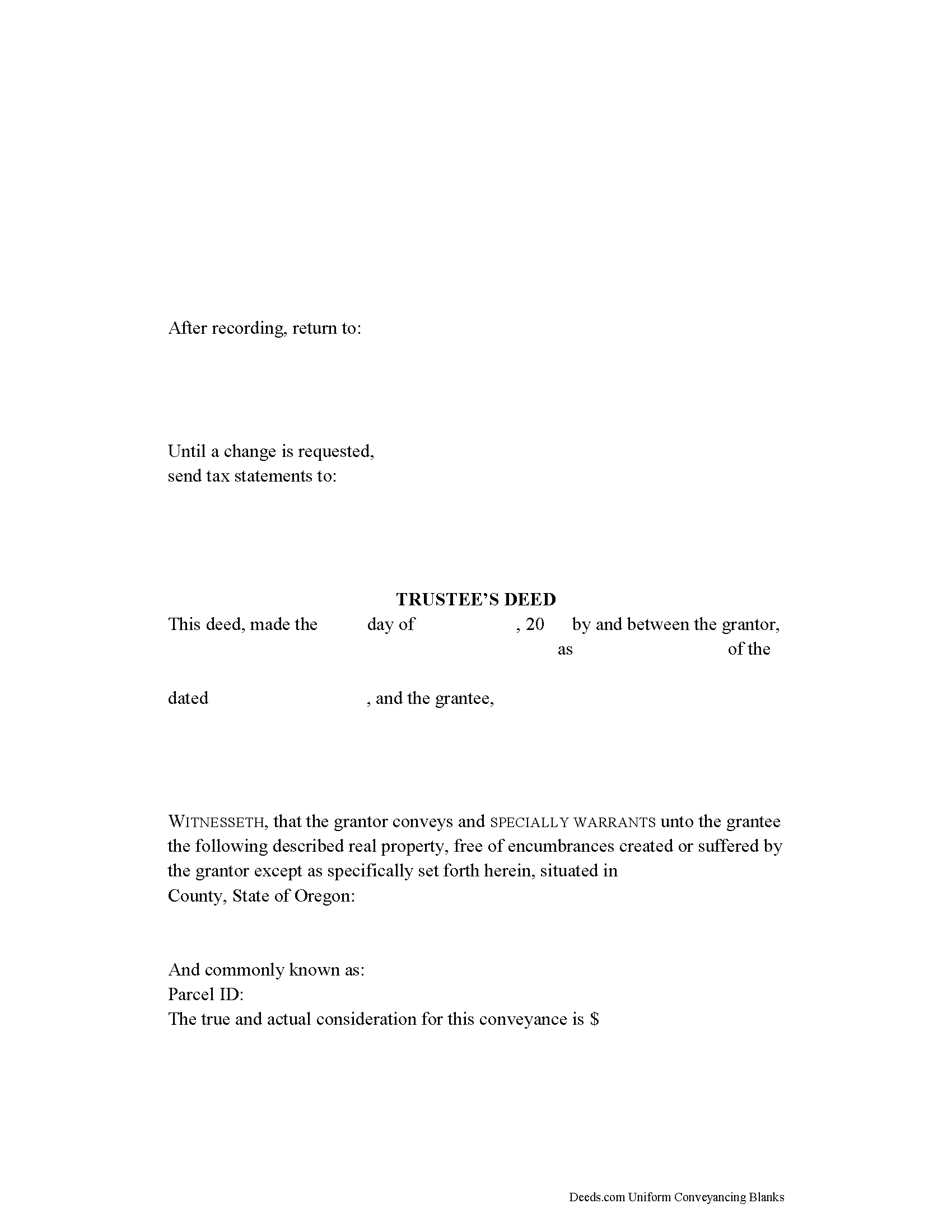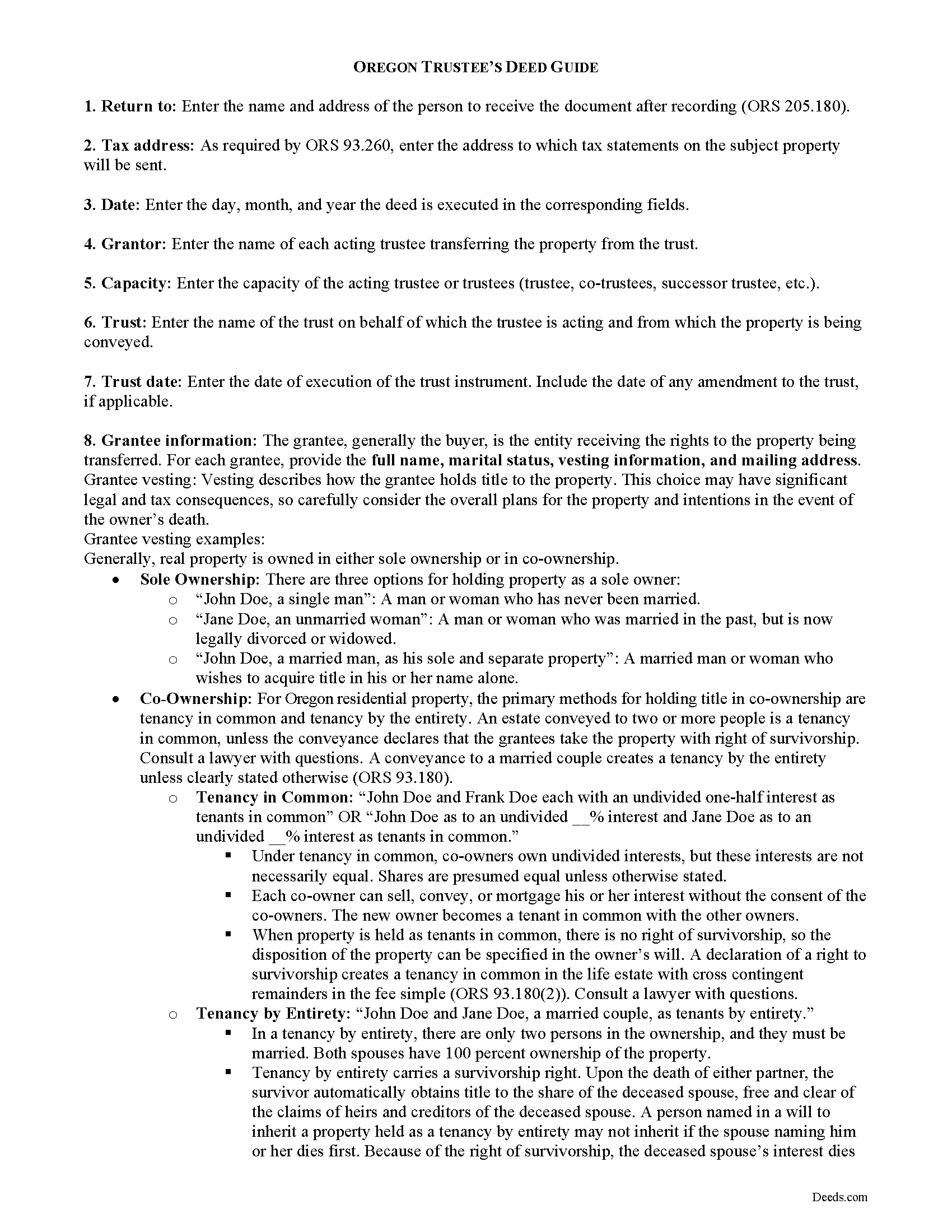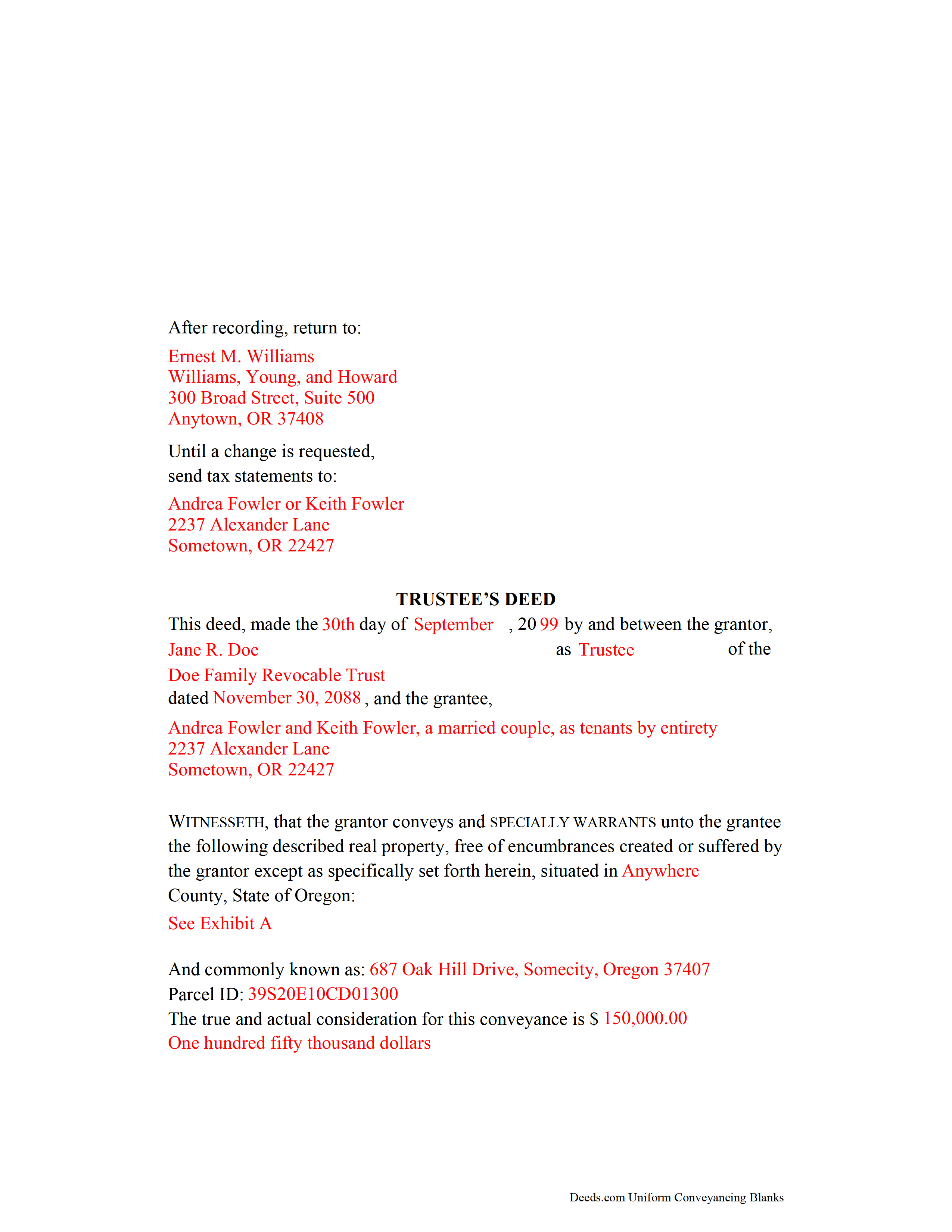Klamath County Trustee Deed Form

Klamath County Trustee Deed Form
Fill in the blank form formatted to comply with all recording and content requirements.

Klamath County Trustee Deed Guide
Line by line guide explaining every blank on the form.

Klamath County Completed Example of the Trustee Deed Document
Example of a properly completed form for reference.
All 3 documents above included • One-time purchase • No recurring fees
Immediate Download • Secure Checkout
Additional Oregon and Klamath County documents included at no extra charge:
Where to Record Your Documents
Klamath County Clerk
Klamath Falls, Oregon 97601
Hours: 9:00am to 4:00pm M-F
Phone: (541) 883-5134
Recording Tips for Klamath County:
- Bring your driver's license or state-issued photo ID
- Check that your notary's commission hasn't expired
- Recorded documents become public record - avoid including SSNs
- Make copies of your documents before recording - keep originals safe
Cities and Jurisdictions in Klamath County
Properties in any of these areas use Klamath County forms:
- Beatty
- Bly
- Bonanza
- Chemult
- Chiloquin
- Crater Lake
- Crescent
- Crescent Lake
- Dairy
- Fort Klamath
- Gilchrist
- Keno
- Klamath Falls
- Malin
- Merrill
- Midland
- Sprague River
Hours, fees, requirements, and more for Klamath County
How do I get my forms?
Forms are available for immediate download after payment. The Klamath County forms will be in your account ready to download to your computer. An account is created for you during checkout if you don't have one. Forms are NOT emailed.
Are these forms guaranteed to be recordable in Klamath County?
Yes. Our form blanks are guaranteed to meet or exceed all formatting requirements set forth by Klamath County including margin requirements, content requirements, font and font size requirements.
Can I reuse these forms?
Yes. You can reuse the forms for your personal use. For example, if you have multiple properties in Klamath County you only need to order once.
What do I need to use these forms?
The forms are PDFs that you fill out on your computer. You'll need Adobe Reader (free software that most computers already have). You do NOT enter your property information online - you download the blank forms and complete them privately on your own computer.
Are there any recurring fees?
No. This is a one-time purchase. Nothing to cancel, no memberships, no recurring fees.
How much does it cost to record in Klamath County?
Recording fees in Klamath County vary. Contact the recorder's office at (541) 883-5134 for current fees.
Questions answered? Let's get started!
Oregon Trustee's Deeds & Transfers from Living Trusts
NOTE: This article pertains to living trusts, a type of express trust as set forth in the Oregon Uniform Trust Code (ORS 130.005). Deeds titled "trustee's deed," which transfer real property by an express trust, should not be confused with deeds titled "trustee's deed upon sale," which are used to convey real property after foreclosure under a deed of trust (see ORS 86.775 for trustee's deeds upon sale).
Oregon is among the majority of states that has adopted or introduced for adoption some form of the Uniform Trust Code, "a set of basic default rules that fairly, consistently and clearly govern voluntary trusts," providing a more consistent and uniform (as the name would suggest) framework of rules to govern voluntary trusts across states. States generally adopt parts of the Uniform Trust Code to work alongside existing legislation. In Oregon, the Uniform Trust Code is codified at Chapter 130 of the Revised Statutes.
A trust is an arrangement whereby a settlor transfers property to another person, a trustee, who manages the assets for the benefit of another (the beneficiary). The Uniform Trust Code requires that the settlor has the capacity and expresses the intention to create a trust; that the trust has a clear beneficiary; that the trustee has duties to perform; and that the same individual is not both sole trustee and sole beneficiary (ORS 130.155). Trusts must be made for purposes that are both lawful and attainable, and for the benefit of the trust's beneficiary (ORS 130.165).
In Oregon, a settlor may create a living trust through a transfer of property to another person or to himself as trustee. The settlor conveys real property into trust by executing a deed that titles property in the name of the trustee as trustee of the trust. As with any transfer, it is important to understand the legal rights and responsibilities of vesting title in the name of a trust. For example, spouses holding property as tenants by the entirety who transfer the property into trust change their rights in the property. Consult an attorney with questions about titling trust assets.
The settlor determines how his assets will be managed and establishes plans for the distribution of the trust's contents after death by executing a trust instrument. This unrecorded document also designates the trustee and the trust beneficiaries. In a living trust, "Appointing a successor trustee is essential" when the settlor also serves as the original trustee; this ensures that the trust will continue to be managed pursuant to the settlor's intentions upon his death or incapacitation.
The Uniform Trust Code gives the trustee all the general powers over trust property "that an unmarried financially capable owner has over individually owned property" unless otherwise limited by the terms set forth in the trust instrument, and the specific power to sell trust property (ORS 130.720, 130.725(2)). In order to transfer real property held in a living trust, the trustee executes a trustee's deed.
The trustee's deed is one in a class of instruments named descriptively after the granting party, rather than the warranty of title conveyed (think administrator's deed, executor's deed, sheriff's deed). A trustee may use any statutory deed to convey interest; a lawyer can help determine the appropriate document for the situation.
In Oregon, there are four statutory short forms for deeds: warranty deed, special warranty deed, bargain and sale deed, and quitclaim deed. A warranty deed (ORS 93.850) conveys the grantor's interest and any and all after-acquired title, along with the covenants that the grantor is seized of the property and has good right to convey; that the property is free from any encumbrances apart from those indicated on the deed; and that he warrants and defends the title against the claims of all persons. A bargain and sale deed (ORS 93.860) conveys interest and any and all after-acquired title, but contains no covenants. A quitclaim deed (93.865) conveys only the interest a grantor may have at the time of the deed (and not any interest the grantor obtains after).
In Oregon, trustees most frequently use a special warranty deed to convey property. A special warranty deed (ORS 93.855) has the same effect as a warranty deed, except that the covenant of freedom from encumbrances is limited to "those created or suffered by the grantor." With a special warranty, the grantor warrants and defends the title more narrowly -- solely against persons claiming "by, through or under the grantor."
In addition to titling property in the name of the grantee, the granting clause of a trustee's deed names all executing trustees (as grantors), along with the trust and the trust date. All instruments pertaining to real property in Oregon also need a statement of the true consideration paid for the transfer, an adequate legal description of the property being conveyed, and the requisite mailing addresses to meet first-page requirements. All trustees involved in the transaction must sign the deed in the presence of a notary public before recording in the appropriate county. Grantees may request that the trustee provide a certification of trust (ORS 130.860) to confirm the trust's existence and the trustee's authority to enter the transaction.
Each case is unique, so consult a lawyer with specific questions or for complex situations relating to express trusts in Oregon and for guidance in preparing a trustee's deed.
(Oregon TD Package includes form, guidelines, and completed example)
Important: Your property must be located in Klamath County to use these forms. Documents should be recorded at the office below.
This Trustee Deed meets all recording requirements specific to Klamath County.
Our Promise
The documents you receive here will meet, or exceed, the Klamath County recording requirements for formatting. If there's an issue caused by our formatting, we'll make it right and refund your payment.
Save Time and Money
Get your Klamath County Trustee Deed form done right the first time with Deeds.com Uniform Conveyancing Blanks. At Deeds.com, we understand that your time and money are valuable resources, and we don't want you to face a penalty fee or rejection imposed by a county recorder for submitting nonstandard documents. We constantly review and update our forms to meet rapidly changing state and county recording requirements for roughly 3,500 counties and local jurisdictions.
4.8 out of 5 - ( 4578 Reviews )
sheila B.
August 19th, 2021
awesome
Thank you!
William A B.
May 20th, 2020
Good service...deed release form as required.
Thank you!
Jason B.
August 8th, 2021
Deeds.com did a great job in explaining exactly what I'd need to file a deed transfer (quitclaim deed). I didn't have to order the forms piecemeal, but was able to order the whole package at once for a reasonable price. Once downloaded, their fill-in-the-blank PDF was easy to use with detailed instructions for each line item. I'd definitely use them again.
Thank you for your feedback. We really appreciate it. Have a great day!
Sheryl G.
November 27th, 2021
Simple way to complete documents with very detailed instructions. And to be able to e-file them is great too.
We appreciate your business and value your feedback. Thank you. Have a wonderful day!
Irma D.
June 14th, 2021
Very impressed with the Service in Miami-Dade County. THank you
Thank you!
Patrick S.
March 4th, 2019
Excellent!
Thank you!
Tim R.
May 9th, 2019
Quick and efficient
Thank you Tim, we appreciate your feedback.
Melody S.
February 11th, 2021
Although I was given quite a bit of information, I wanted my property title. I was not informed of what I would receive before I paid for this service.
Thank you!
Dean B.
September 17th, 2020
I needed to cut and paste my phone number with the dashes in order to use this website with my iPhone
Thank you!
Jim B.
December 22nd, 2021
Would be great if you would just put all of these documents into ONE .pdf.
Thank you for your feedback. We really appreciate it. Have a great day!
Joseph B.
March 30th, 2021
Awesome!
Thank you!
Daniel M.
May 24th, 2023
It was quick and easy!! I recommend this site for your needs!!
Really appreciate you Daniel, thanks for the kind words.
ruth l.
January 6th, 2021
I found this sight very helpful. All the information that one needs to file a quit claim deed. thank you so much.
Thank you!
Jeff R.
December 4th, 2020
Great company. I had some issues with what I had prepared on my end but my contact at Deeds.com helped me with modifying the documents and submitted them successfully. Thanks for going the extra mile
Thank you for your feedback. We really appreciate it. Have a great day!
Charles D.
November 17th, 2020
Very easy to download, very easy to use. Good examples to answer questions.
Thank you!